What the Heck Happened?
After the 2016 presidential campaign, everyone wrote a book.
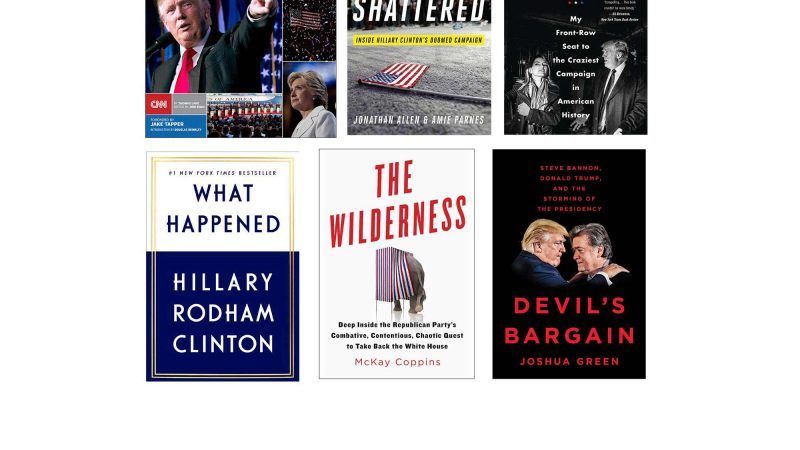
Devil's Bargain: Steve Bannon, Donald Trump, and the Storming of the Presidency, by Joshua Green, Penguin Press, 272 pages, $27
Shattered: Inside Hillary Clinton's Doomed Campaign, by Jonathan Allen and Amie Parnes, Crown, 480 pages, $28
Unbelievable: My Front-Row Seat to the Craziest Campaign in American History, by Katy Tur, Dey Street, 305 pages, $26.99
Unprecedented: The Election That Changed Everything, by Thomas Lake, Melcher Media Inc., 288 pages, $40
What Happened, by Hillary Rodham Clinton, Simon & Schuster, 512 pages, $30
The Wilderness: Deep Inside the Republican Party's Combative, Contentious, Chaotic Quest to Take Back the White House, by McKay Coppins, Little Brown, 400 pages, $28
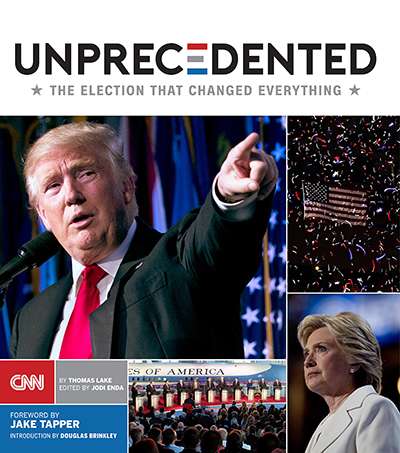
By my count, there are already well over a dozen books about the 2016 presidential campaign. The first to appear was CNN reporter Thomas Lake's Unprecedented: The Election That Changed Everything, published just a week after Election Day. Technically speaking, Unprecedented wasn't even the first: BuzzFeed's McKay Coppins wrapped up his book The Wilderness in late 2015, a full year before Election Day. And though there are many things to be praised about The Wilderness, its prescience is not among them.
The journalist who invented the quick campaign history, Theodore White, couldn't find a publisher in 1959 when he first came up with the idea of writing an entire book on the 1960 election. Friends warned him that such readers as he could scrape up would be jabbing hot needles in their eyes within the first 100 pages.
But the fly-on-the-wall technique White brought to The Making of the President 1960, mixing accounts of rallies and strategy sessions with vivid descriptions of what the candidates wore or had for dinner, was a monster commercial and critical success that won a Pulitzer prize.
White wrote four more making-of books. By 1972 he had a host of imitators, all of them hovering about the candidates like a cloud of flies, duly noting every grunt and sneeze. White surveyed the scene and felt like Dr. Frankenstein amid a crowd of his appalling creations. "I sincerely regret it," he said of what he had wrought. "Who gives a fuck if the guy had milk and Total for breakfast?"
The Class of 2016's election books contain a lot less of that sort of New Journalism–style omniscience, if only because the principal two candidates regarded reporters as lying swine who should be kept far away, if not simply shot.
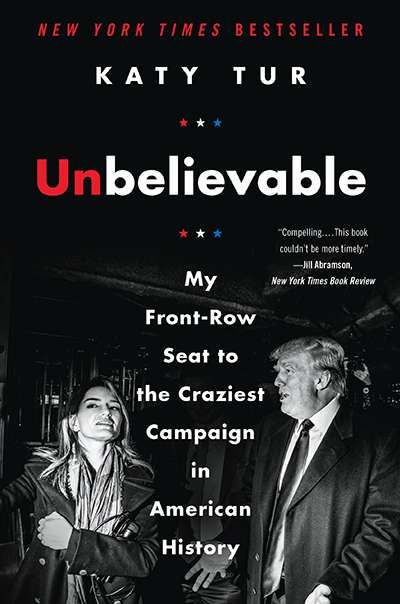
Donald Trump actually wavered on that last point. NBC reporter Katy Tur's Unbelievable describes a rally where the candidate, musing on Vladimir Putin's reputation for knocking off annoying journalists, weighed the pros and cons. "I hate them, but I would never kill them. I'd never do that," he announces, then pauses in contemplation. "No, I wouldn't," he decides. "But I do hate them." (He soooo wasn't kidding. Tur also describes a night when a reporter colleague got a call from Trump's press office. "Are we off the record?" the Trump staffer inquired. Sure, replied the reporter. "Great," continued the staffer. "Off the record, Mr. Trump wants you to go fuck yourself.")
The only dietary commentary comes from Hillary Clinton's What Happened, in which the Democratic nominee is more than happy to offer an exhaustive list of her favorite repasts—Oreo ice cream bars, sliced jalapeño peppers, Ninja Squirrel Sriracha hot sauce, Pepperidge Farm Goldfish crackers, brownies made with chickpea flour—rather than write anything about why she lost. One demographic that probably sighed with relief after reading What Happened was the White House kitchen staff, which is unlikely to have reacted well to the news that Clinton's preferred method of serving Quest protein bars is to warm them up by sitting on them.
So this time around we won't learn the candidates' comparative baby-kissing numbers. (White thought the presence of babies at rallies a revealing statistic—parents were more inclined to bring them to an event with a likely winner, he figured, so they could be told later: Honey, you saw the president.) But there are still some lessons to be drawn from the post-election library, including a few that don't revolve around pussy grabbing or email deleting.
Not all of the 2016 books conform to the traditional model of election literature. Tur—as the first TV reporter assigned full-time to the Trump campaign, she was, after Fox News' Megyn Kelly, probably the candidate's least favorite—has produced more of a personal memoir of her time on the road. Breezily written, it's full of useful tips for young reporters (Fox News' Carl Cameron always gets his hair spray past security by telling Secret Service agents, "You taking my hairspray is like me taking your gun"; "Whatever you do, don't sleep with a Secret Service agent").
It also offers the starkest illustration I've ever seen of what's wrong with cable news. When Trump announced, in an email blast, that as president he would ban all Muslim immigrants from entering the United States, the MSNBC desk called Tur within moments, demanding a live phone-in report. I don't really know anything about it yet, replied the harried Tur, but I could—
"Just talk," ordered the imperious editor.
"So I tap dance," Tur admits. What follows are several empty-headed minutes of pure blather exchanged with an anchor who doesn't know anything more than she does. Feeding the beast, TV people call it, referring to the gaping 24-hour cable TV maw. But the ones being force-fed mush are the viewers.
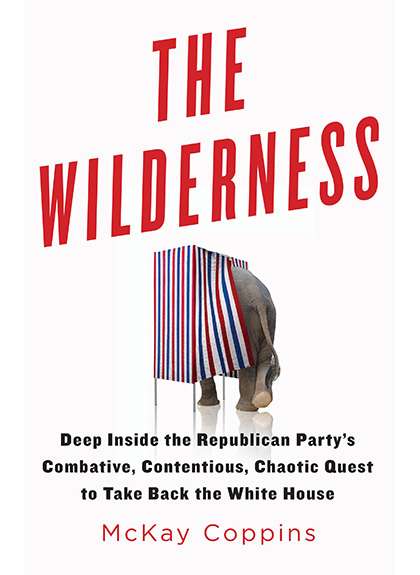
The Wilderness also avoids the Ted White model, if for no other reason than that it appeared so early. Why McKay Coppins chose to bring out this book before the election, and how he got a publisher to agree to such a determinedly uncommercial course, is an even deeper mystery than how Ted Cruz's connections to the Kennedy assassination became a campaign issue. The predictable result is that the book looks almost willfully dumb.
It dismisses Trump as "a reality TV loudmouth," the product of "a tiny poisonous fringe" of supporters, who could—and Coppins made it clear, probably would—"flame out at any moment." When that happened, Coppins wrote, it would prove that "the Republican party still had not found its Moses" and confirm his hypothesis that Mitt Romney's spiritless 2012 defeat was the dying shriek of a prehistoric GOP beast sinking in a tar pit.
If that were Coppins' worst analytical mistake, it might not be so bad; lots of people—particularly in Clinton headquarters—failed to grasp Trump's growing strength.
But The Wilderness is pockmarked with the shrapnel of Coppins' exploding political conceits. He spends an amazing amount of time on the putative campaign of Paul Ryan, which dissolved before he ever declared his candidacy. Coppins has a similar fascination with Gov. Bobby Jindal, whose campaign didn't make it out of 2015, and Carly Fiorina and Rand Paul, who dropped out within a few days of each other, just after the first primaries.
In fact, if you exclude Sen. Marco Rubio of Florida, whose campaign was the closest to viable of those that attracted Coppins' attention, the candidates he singled out collected less than 400,000 votes among them over the whole course of the race for the Republican nomination. That's about one-quarter the number Trump got in California alone.
Analytical blockhead that Coppins may be, he's a terrific reporter and an entertaining writer. The Wilderness is by no means a bad book, as long as you're not trying to find out what actually happened in the Republican race.
Whether it's a 13-year-old Rand Paul at the 1976 Republican convention shrieking taunts up at the Rockefeller luxury box and then dodging garbage thrown out the Rockefellers' window, or Bobby Jindal participating in the exorcism of a college girlfriend (complete with trances and weird devil voices, though no pea-soup vomit is reported), or Jeb Bush pinching a male reporter's butt during a journalistic scrum, the book's vignettes are spellbinding. I don't know if Trump has read it, but if you hear Jindal has been enlisted into a Pentagon task force on North Korea, get ready to rumble.
Most of the books in this genre focus more sharply on the individual general election campaigns, though sharply is perhaps an odd word to apply to What Happened, Clinton's whiny and evasive aliorum culpa. In Clinton's telling of the election, she was constantly besieged by an international conspiracy led by Julian Assange, Putin, and of course Trump.
Clinton's certainty that she was the constant object of conspiracy rises to a level of derangement that is almost impossible to describe. She suggests that Trump deliberately picked a fight with Khizr and Ghazala Khan to blunt the rollout of her economic plan. No matter that it was her campaign that initiated the entire episode.
It's possible that the cabal was even broader. At the end of a long, technophobic rant about everything from automated assembly lines to self-driving cars, Clinton warns that "artificial intelligence could one day pose an existential security threat." (Scoff if you must, but she has a powerful argument: "Have you ever seen a movie where the machines start thinking for themselves that ends well?") Her worries eventually reached the point that "my staff lived in fear I'd start talking about 'the rise of the robots' in some Iowa town hall," Clinton writes. "Maybe I should have."
Even leaving the dark whispers between internet-connected coffee pots and toasters out of it, Clinton's certainty that she was the constant object of conspiracy rises to a level of derangement that is almost impossible to describe. At one point she suggests that Trump deliberately and nefariously picked a public fight with Khizr and Ghazala Khan—a Pakistani-American couple whose son was killed in Iraq—to blunt the rollout of her economic plan. No matter that insulting a Gold Star mother on television was the single most costly move of Trump's campaign. (Some polls show that nearly 40 percent of the electorate was less inclined to vote for him following his vituperative attacks on the Khans.) No matter, either, that it was the Clinton campaign that initiated the entire episode by putting the couple onstage at the Democratic National Convention to accuse Trump of anti-Muslim bigotry.
This sort of distortion, to use an extremely kind word for it, recurs throughout What Happened. Clinton complains that she "didn't realize how quickly the ground was shifting under all our feet" because of changes in election law, including the Supreme Court's ruling in Citizens United that allowed unlimited independent campaign donations. She fails to mention that she raised $581 million compared to Trump's $340 million (of which $66 million was his own money). If Citizens United created an advantage for anybody, it certainly wasn't her opponent.
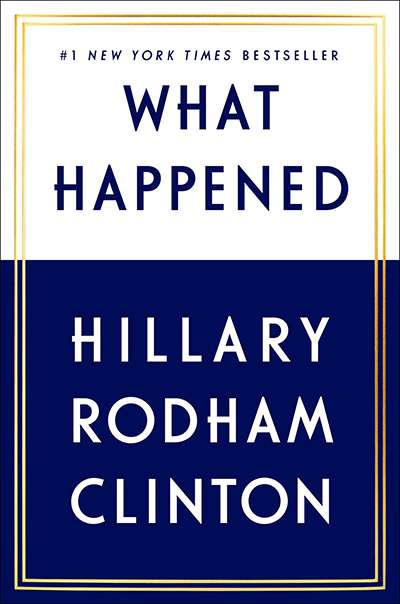
The faults in What Happened are legion. Have I mentioned the lush descriptions of the emotional and intellectual acuity of Clinton's daughter Chelsea, or the odes to the courage of her mother Dorothy Rodham, or the lengthy citation from her husband's bowdlerized convention speech about their courtship and marriage?
Even Clinton's own staff was queasily bemused by that one. Shattered, a detailed account of her campaign by Washington reporters Jonathan Allen and Amie Parnes, quotes from Bill's description of how his introduction to Hillary was delayed when he couldn't quite summon the courage to speak to her after following her out of a Yale law school class. "I got close enough to touch her back, but I couldn't do it," Bill said. "Everyone's mind went to the same place," one of Hillary's friends told Allen and Parnes: Was it actually Hillary's back that Bill was on the verge of touching?
But if What Happened is well stocked with material for a new line of Hallmark greeting cards, it's got very, very little about how its author managed to lose a presidential election to a man she calls "a clear and present danger to the country and the world" who "remade himself from tabloid scoundrel into right-wing crank."
Grotesque blunders like her dismissing half of Trump's supporters—about 31.5 million Americans—as "a basket of deplorables" are brushed aside in a page or so. Others go completely unremarked. There's not a word about the most profoundly damaging misanalysis of the whole election: the Clinton campaign's insanely ironic fear, during the last days, that Trump might win the popular vote but lose in the Electoral College.
This peculiar belief, Politico would report a month after the election, prompted the Clinton braintrust to pour several million dollars into places like Illinois (where Clinton would win 56–39 percent) and Louisiana (where she would lose 58–39) to maximize turnout in Clinton strongholds like Chicago and New Orleans, running up the score in the popular vote. Had that money gone instead to battleground states like Wisconsin, Michigan, and Pennsylvania, which Clinton would lose by a combined total of just 80,000, it might have turned the election.
The deficiencies of What Happened are all the more glaring because the real narrative of the race, almost everybody agrees, is the Clinton crackup. Trump's entire campaign was a continuous-loop blooper reel—Pussy grabbing! POWs are losers! Blood coming from her wherever!—but he did one big thing right: He kept the focus on Clinton. Her serial missteps so regularly chewed up her lead in the polls, according to Shattered, that her staff's mantra became "We're not allowed to have nice things."
Everybody on the staff knew, for instance, that Clinton's friend and aide Huma Abedin was a ticking time bomb for the campaign. It was more than bad enough that Abedin's husband, former congressman Anthony Weiner, had a distressing compulsion to share pictures of his junk with women he wasn't married to. But Abedin maximized the potential damage to the campaign by maintaining a high profile, doing fashion pictorials in Vogue and agreeing to appear in a documentary about Weiner's texting scandals.
"Abedin had broken the old political rule that aides should never overshadow their bosses," Shattered notes. And when yet another one of Weiner's texts surfaced—this one showing him in bulging underwear, lying on a bed next to his sleeping 4-year-old son—it helped erase the 4 percent bounce in the polls Clinton had gotten from her favorably received appearance at the Democratic convention.
The "basket of deplorables" line wasn't just a momentary screwup, but a regular speech Clinton had been giving in private for weeks, certain it would never get out to make a mockery of her "Better Together" slogan.
Still Clinton wouldn't ask Abedin to leave, not even after the story broke less than a month later that Weiner was under FBI investigation for sending salacious texts to a 15-year-old. It wasn't until a load of Clinton's State Department emails turned up on Weiner's computer just a few days before the election, another gut-punch to the campaign, that Abedin left—by her own decision, not Clinton's.
Clinton's propensity for self-inflicted wounds meshed neatly with the strategy of Steve Bannon, the Breitbart chief who became Trump's third and final campaign manager. Bannon had assembled a crew that cared less about electing Trump than destroying Clinton, whom they had been targeting for political extinction since she was first lady. (One key operative, a Republican hatchet man named David Bossie, was the auteur behind both Hillary: The Movie—the vituperative film that led to the Citizens United decision—and the infamous "Life's a Bitch, Don't Vote for One" bumper sticker.)
Their game plan was not so much to control their notoriously unpredictable candidate as to wrangle him in a single direction. "Trump's focus, especially when things were going badly, thrashed around like a loose firehose. He would attack Megyn Kelly one day, then go after the parents of a slain Muslim soldier the next," writes Bloomberg Businessweek correspondent Joshua Green in Devil's Bargain, his chronicle of the Trump-Bannon partnership. The latter "kept Trump focused on a single target at which to direct his ample talent for attacking and belittling people: 'Crooked Hillary.'"
It worked because Clinton, despite having spent nearly her entire adult life in and around politics, was a lousy politician who, long before she faced the kidney punching from Trump, had trouble even delivering a coup de grace to a bag-of-bones socialist from Vermont.
On the day of the convention her staff had to bring in a coach, because, despite three decades of giving campaign speeches for Bill as well as herself, Clinton still didn't understand how to deliver an applause line.
At least she accepted the speaking advice, noted Shattered; often, her response to criticism was to fly into a rage. When an aide, during a prep session for a debate with Sanders, said one of her responses was "not very good," she furiously replied, "Really? Why don't you do it?" For half an hour, the aide was forced to play Clinton in a mock debate, and no matter what he said, she childishly interrupted him to snarl, "That isn't very good, you can do better."
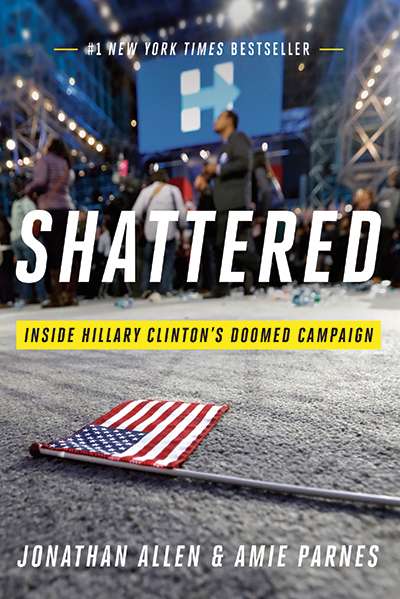
In her own book, Clinton describes this episode as a lot of chortling good fun; Shattered calls it a "browbeating" and quotes an employee saying: "She was visibly, unflinchingly pissed off at us as a group." Her staff began moving tough questions to the end of debate practice because she so often stormed away and refused to continue.
Clinton's insular refusal to listen to outside guidance, her inability to get outside Clintonworld, led to both gaffes and strategic shortcomings. Among the most damaging of the former was the "basket of deplorables" episode. According to Shattered, this wasn't just a momentary screwup, but a regular speech she'd been giving in private for weeks, certain it would never get out to make a mockery of her "Better Together" slogan. It did—not through a malicious leaker, but because Clinton herself delivered the address to a gathering that, she had forgotten, included reporters.
The worst strategic breakdown resulted from Clinton's suffocating embrace of identity politics. Both Clinton and her data analysts believed that the enormous turnout of black voters that had swept Barack Obama into office was the new normal. (Data analytics uses past election performances to predict who will show up at the polls and how they'll vote; Clinton's campaign chieftains believed in it like a religion.) So, bolstered by her husband's self-proclaimed status as the first black president, Clinton oriented her entire campaign to appeal to African Americans.
That was effective in the Democratic primaries, where black voters have a presence wildly out of proportion to their numbers in the overall U.S. population. Between them and the appointed superdelegates (drawn overwhelmingly from the party establishment, which was Clinton's kingdom), she used a blunt numbers game to put down Bernie Sanders.
But as early as the Michigan primary, which Clinton lost in a major upset, it was apparent that she was driving away whites. "She'd become the candidate of minority voters on social justice issues," declares Shattered. "Whether she was perceived as hostile to working- and middle-class whites or just indifferent, it wasn't a big leap from 'she doesn't care about my job' to 'she'd rather give my job to a minority or a foreigner than fight for me to keep it.'"
The short shrift Clinton gave to white voters kept her unaware of their surging populism and their fears about an economy that, the Obama administration's pronouncements notwithstanding, didn't look all that strong to them. By the Wisconsin primary, she was losing white voters by 59–40 percent.
Trump's campaign relied on data analytics, too. But his analysts believed, correctly, that the big black turnouts of 2012 and 2016 were triggered by the participation of the actual first black president, Barack Obama. And they realized that the same forces of discontent that drove the Brexit vote and the swelling support for right-wing candidates throughout Europe were at work in the United States.
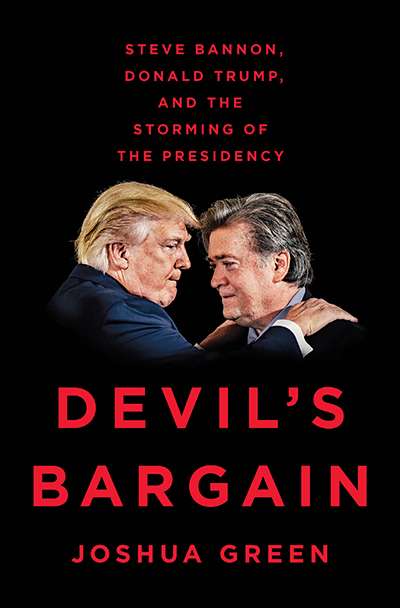
Trump's team reprogrammed their computers to assume a turnout that would be "older, whiter, more rural and more populist than almost anyone else believed," Green writes in Devil's Bargain. The results led them to deploy more resources in Florida, Michigan, Pennsylvania, and Wisconsin, four states Clinton thought were locked down but which all flipped Republican in the final days.
Since the election, Clinton's instincts remain as erratic as ever. In What Happened, she makes much of the FBI's last-minute disclosure that her errant State Department emails had turned up among the dick pics on Weiner's computer. But just as no vast right-wing conspiracy could have impeached her husband back in the day if he hadn't been practicing stupid cigar tricks with a White House intern, the FBI would have had nothing to talk about if Clinton had kept her emails on government computers where they belonged. The demise of her presidential campaign had much less to do with the FBI or sexism or Russians than the fact that, as Shattered notes, "There's no nuance in the business end of a pitchfork."
There was plenty of weirdness, though. If Theodore White were still writing election histories, he might have called this one The Unhinging of the President 2016. From Clinton's killer robots to Trump's description of her 2008 defeat as getting "schlonged" by Obama, no election has ever been so awesomely nuts. In Unbelievable, Tur describes a game reporters sometimes played among themselves in which they tried to imagine headlines too bughouse even for 2016. It abruptly ended, she writes, when BuzzFeed published a real story titled "I Heard Ivanka Trump Talk About 'Mulatto Cocks.'" Case closed.
